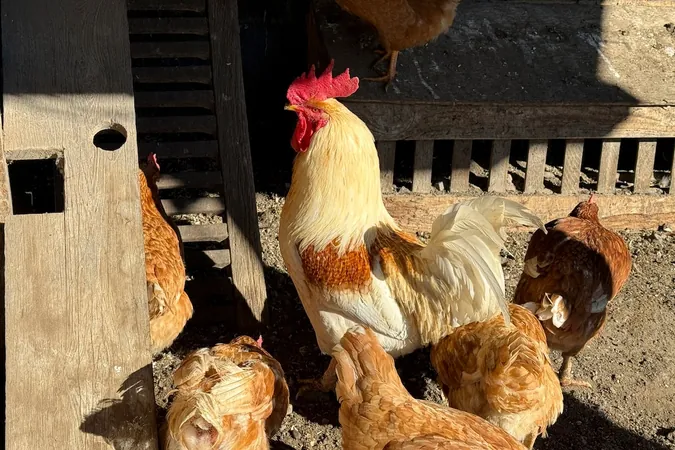
Heartbreaking Decision: Campbell River Petting Farm Forced to Cull Entire Bird Flock Due to Avian Flu Outbreak
2024-11-07
Author: Emma
A beloved petting farm in Campbell River, Vancouver Island, has announced the gut-wrenching decision to cull its entire flock of approximately 50 chickens and ducks after a sudden outbreak of the highly contagious avian flu. Holly Hill Farm expressed its devastation on social media, sharing that each feathered friend had a name and a place in their hearts. However, the farm made the difficult choice to prevent further spread of the virus and protect food supply chains.
According to Island Health, the risk to human visitors remains "extremely low." They have advised recent visitors to the farm to keep an eye on any flu-like symptoms for up to 10 days post-visit, as a precaution. Dominic Abassi, a spokesperson for Island Health, confirmed that their public health communicable team is closely monitoring the situation and has reached out to individuals who visited the farm as part of their response strategy. Visitors who came into contact with the birds have been advised to be vigilant for any signs of illness.
While the bird flock has been lost, Holly Hill Farm reassured its patrons that all other animals on the property are safe, with ongoing health monitoring in place. The situation reflects a broader national concern, as the Canadian Food Inspection Agency (CFIA) attributes the current avian flu outbreaks to migratory birds. This season has seen a dramatic escalation, with reports indicating that 15 farms across the province are currently affected. Since the resurgence of the disease starting in the spring of 2022, over six million birds have been culled in British Columbia alone.
In its social media statement, Holly Hill Farm revealed that it acted swiftly by informing both Island Health and the CFIA, which led to the instruction to cull the infected animals. The farm reassured supporters that the elimination was carried out humanely and in accordance with health regulations. They noted that after a thorough cleaning process, they may be able to welcome chickens and ducks back within approximately 14 days, although the decision to restock their flock remains uncertain at this point.
As this outbreak unfolds, petting farms, poultry producers, and the public alike are urged to remain vigilant. With the Canadian poultry industry facing significant challenges, the health authorities are emphasizing the importance of biosecurity measures to combat the spread of avian flu. The heartfelt loss felt by Holly Hill Farm serves as a poignant reminder of the impact of this disease on local communities.
Stay tuned as we continue to follow this developing story and its implications for animal welfare and public health!









 Brasil (PT)
Brasil (PT)
 Canada (EN)
Canada (EN)
 Chile (ES)
Chile (ES)
 España (ES)
España (ES)
 France (FR)
France (FR)
 Hong Kong (EN)
Hong Kong (EN)
 Italia (IT)
Italia (IT)
 日本 (JA)
日本 (JA)
 Magyarország (HU)
Magyarország (HU)
 Norge (NO)
Norge (NO)
 Polska (PL)
Polska (PL)
 Schweiz (DE)
Schweiz (DE)
 Singapore (EN)
Singapore (EN)
 Sverige (SV)
Sverige (SV)
 Suomi (FI)
Suomi (FI)
 Türkiye (TR)
Türkiye (TR)